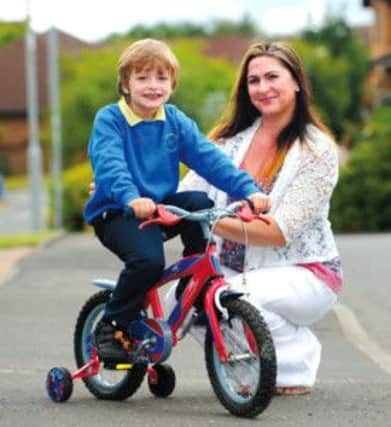Insurers reject mother’s claim for autistic son


The Financial Ombudsman has upheld a decision by insurance firm Bright Grey to refuse the claim lodged by a family from East Kilbride.
The National Austistic Society (NAS) Scotland said the ruling was wrong and will set a precedent for other cases involving autism.
Advertisement
Hide AdAdvertisement
Hide AdCatriona McRoberts, 41, made a claim in April 2012 for her son Kyran on the children’s critical illness cover she took out with Bright Grey in 2010.
Kyran was 17 months old when he started to “lose” learned words. He also did not like to be touched and would become extremely upset over seemingly minor things.
Now aged four, he has autism-related digestive, bowel and respiratory conditions and a low immune system, which means he struggles with illness every four to six weeks.
His mother gave up a career with Strathclyde Police to become a full-time carer. She has two other children, Logan, five and Georgia, 11, and cares for her mother, who has vascular dementia and cardiomyopathy.
“Kyran can’t wash or dress himself, but my other children could do that at the same age,” she said. “You instruct and they perform, but that’s not how it goes with Kyran. You instruct and you instruct and you instruct, but he can’t retain the information that’s given to him.”
When McRoberts and her husband Allan made the claim to secure the financial support needed to give Kyran the care he needs, Bright Grey said that autism was not listed as a critical illness and that the claim was instead considered under Loss of Independent Existence (LOIE). Under these terms, the firm said that Kyran’s claim did not satisfy the criteria for the “mental failure” aspect of the benefit.
When the family challenged this, the insurance firm replied: “The ‘mental failure’ definition was ruled out as it requires a progressive loss of ability to do certain things, which is not the case with autism, as it is expected that abilities will improve with age.”
Experts describe autism as a lifelong disability that affects how a person communicates with and relates to other people and the world around them.
Advertisement
Hide AdAdvertisement
Hide AdThe couple complained to the Financial Ombudsman and were left bitterly disappointed when it upheld the insurance firm’s decision last week.
McRoberts said the firm had misinterpreted medical evidence given by Kyran’s community paediatrician and his educational psychologist.
She said: “They have misinterpreted the educational psychologist note. I feel they have looked at it all and said ‘I think we should just decline this one because there is room for improvement here’. With appropriate support and interventions there may be some room for improvement. However, that’s not always guaranteed to remain with the child.”
McRoberts said that she was now appealing the decision.
Robert MacBean, policy and campaigns officer for NAS Scotland, said: “While with the right support at the right time, people with autism can learn coping strategies to help them live with and manage their condition, it is a lifelong disability.
“Its impact may change over time but the person with autism will live with and experience difficulties associated with the condition throughout their life.
“The Financial Ombudsman must ensure full understanding of the true nature of autism when making potentially far-reaching decisions of this kind.”
He added that the NAS would welcome the opportunity to work with the insurance industry to improve awareness of autism and “help ensure the fairest possible outcome for claimants affected by the condition.”
A spokesman for the Financial Ombudsman said: “The impact of our decisions can be considerable on both the person bringing the complaint – and their family – and the sums involved are often considerable, which means these cases are often hard-fought.
Advertisement
Hide AdAdvertisement
Hide Ad“As a result, we believe it’s vital that everyone making a complaint about a critical illness policy has every opportunity to provide us with the information we need to consider their case.”
Phil Stafford, head of claims at Bright Grey, said the firm had looked at Kyran’s case “in detail and reviewed his condition with the help of his specialists.”
He added: “We recognise that autism is a lifelong developmental disorder, but it isn’t covered by our policy definitions and, therefore, doesn’t meet the criteria to allow us to pay the claim. While there is no cure for autism and the eventual developmental outcome is uncertain.”
He added that they stood by the medical evidence given that Kyran had continued to develop and was expected to improve.